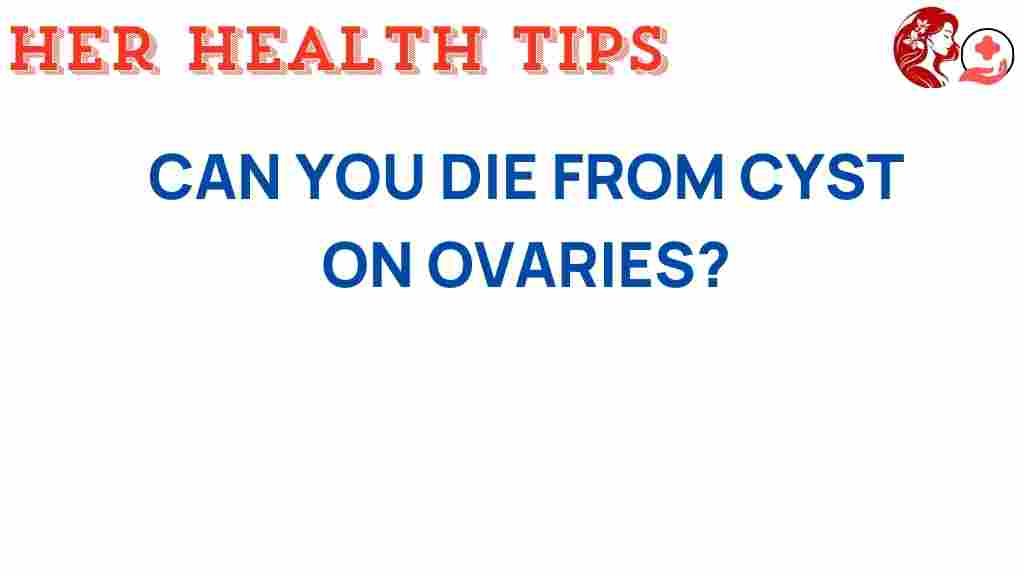The Hidden Dangers: Can Ovarian Cysts Lead to Serious Health Risks?
Ovarian cysts are fluid-filled sacs that develop on a woman’s ovary. They are a common occurrence and often go unnoticed, but many women may wonder if these cysts pose serious health risks. Understanding the implications of ovarian cysts is crucial for maintaining women’s health. In this article, we will explore the symptoms, diagnosis, treatment, complications, and prevention of ovarian cysts, shedding light on their potential health risks.
Understanding Ovarian Cysts
Ovarian cysts are usually benign, meaning they are not cancerous. They can vary in size and may occur as a result of the normal menstrual cycle. However, it’s essential to monitor them as some cysts can lead to complications.
Symptoms of Ovarian Cysts
Many women with ovarian cysts may not experience any symptoms. However, when symptoms do occur, they can include:
- Pelvic pain or discomfort
- Menstrual irregularities
- Increased menstrual pain
- Abdominal bloating or swelling
- Nausea or vomiting
- Frequent urination or difficulty emptying the bladder
Recognizing these symptoms early can be vital in managing health risks associated with ovarian cysts.
Diagnosis of Ovarian Cysts
Diagnosing ovarian cysts typically involves a combination of physical examinations and imaging tests. Here are the common methods:
- Pelvic Examination: A healthcare provider will check for abnormalities in the pelvic area.
- Ultrasound: This imaging test uses sound waves to create images of the ovaries and can show the size and type of cyst.
- Blood Tests: Hormonal levels can be assessed to determine if further action is necessary.
Early diagnosis is crucial in minimizing health risks associated with ovarian cysts.
Treatment Options for Ovarian Cysts
The treatment for ovarian cysts often depends on their size, type, and associated symptoms. Here are the common treatment options:
- Watchful Waiting: Many cysts resolve on their own without treatment. Regular monitoring by a healthcare provider is often sufficient.
- Medication: Hormonal contraceptives may be prescribed to regulate the menstrual cycle and prevent the formation of new cysts.
- Surgery: In cases where cysts are large, persistent, or cause significant symptoms, surgical intervention may be necessary.
It is essential for women to consult with healthcare providers to choose the most appropriate treatment for their specific situation.
Complications of Ovarian Cysts
While most ovarian cysts are harmless, some can lead to serious health risks and complications, including:
- Cyst Rupture: A ruptured cyst can cause severe pain and internal bleeding, requiring immediate medical attention.
- Ovarian torsion: This condition occurs when an ovary twists around its supporting ligaments, cutting off its blood supply.
- Hormonal imbalances: Some cysts can affect hormone production, leading to menstrual irregularities and other symptoms.
Understanding these complications is vital for maintaining reproductive health and addressing potential health risks.
Preventing Ovarian Cysts
While not all ovarian cysts can be prevented, certain lifestyle changes may reduce the risk of developing them:
- Maintain a Healthy Weight: Obesity can increase the risk of ovarian cysts.
- Regular Exercise: Physical activity can help regulate hormones and improve overall health.
- Balanced Diet: A diet rich in fruits, vegetables, and whole grains supports reproductive health.
- Regular Check-ups: Routine gynecological exams can help monitor ovarian health.
Implementing these preventive measures can be beneficial for women’s health.
Troubleshooting Tips for Managing Ovarian Cysts
If you suspect you have an ovarian cyst or have been diagnosed with one, consider the following tips:
- Keep a Symptom Diary: Track any symptoms you experience and discuss them with your healthcare provider.
- Educate Yourself: Understanding ovarian cysts can help alleviate anxiety and empower you to make informed decisions.
- Seek Support: Joining support groups can provide emotional support and practical advice from others facing similar health risks.
These steps can assist in managing the condition and improving quality of life.
Conclusion
Ovarian cysts are common and often benign, but they can lead to serious health risks if not monitored properly. Understanding the symptoms, diagnosis, treatment, and complications associated with ovarian cysts is essential for maintaining women’s health. By taking preventive measures and seeking timely medical advice, women can manage their reproductive health effectively.
For more information on women’s health and ovarian cysts, visit WomensHealth.gov. If you have further questions about your health, consult your healthcare provider for personalized advice.
Remember, knowledge is power when it comes to health risks associated with ovarian cysts. Stay informed and proactive about your reproductive health!
This article is in the category Reproductive and created by HerHealthTips Team
